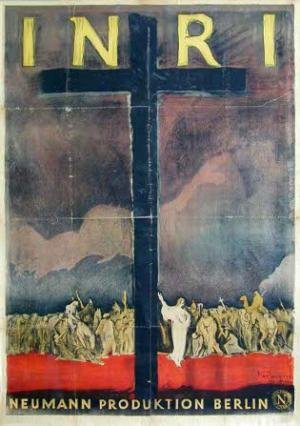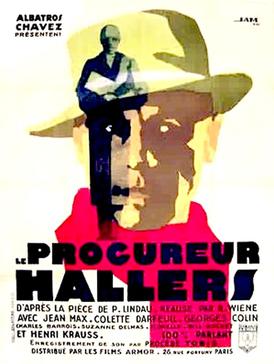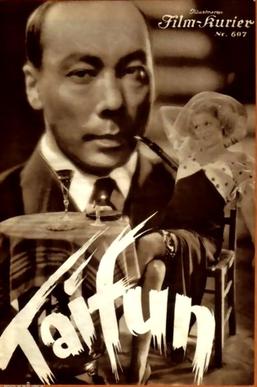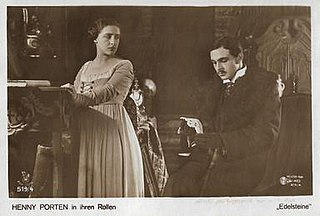Related Research Articles

Robert Wiene was a German film director, screenwriter and producer, active during the silent era. He is widely-known for directing the landmark 1920 film The Cabinet of Dr. Caligari and a succession of other expressionist films. Wiene also directed a variety of other films of varying styles and genres. Following the Nazi rise to power in Germany, Wiene, who was of Jewish descent, fled into exile.
Rodion Romanovich Raskolnikov the fictional protagonist of Dostoyevsky's novel Crime and Punishment.
Life Is a Dream is a 1917 German silent drama film directed by Robert Wiene and starring Emil Jannings, Bruno Decarli and Maria Fein. A young aristocrat meets a man and marries him, but soon discovers he is a monster. After his death she grows increasingly mad, until a revolutionary new cure is attempted which makes her believe that the whole episode was simply a dream.

Frau Eva is a 1916 German silent drama film directed by Robert Wiene and starring Erna Morena, Emil Jannings and Theodor Loos. It was based on the 1874 novel Fromont and Risler by Alphonse Daudet. The film was Jannings' first starring role, his previous appearance having been as an extra in Im Schützengraben.
Playing with Fire is a 1921 German silent comedy-drama film directed by Georg Kroll and Robert Wiene and starring Diana Karenne, Vasilij Vronski, Ossip Runitsch, and Anton Edthofer. It was shot at the Babelsberg Studios in Berlin. The film received a generally positive reception from critics, although some were doubtful about the blending of farce and tragedy.
A Woman's Revenge is a 1921 German silent drama film directed by Robert Wiene and starring Vera Karalli, Franz Egenieff and Olga Engl. In order to punish her cold, brutal aristocratic husband for murdering her lover, a woman becomes a common prostitute to shame him. The film received largely negative reviews.
The Woman on the Rack is a 1928 German silent drama film directed by Robert Wiene and starring Lili Damita, Vladimir Gajdarov, and Johannes Riemann. It was also known by the alternative title A Scandal in Paris. It was based on a British play by Edward Hemmerde and Francis Neilson. The wife of a British aristocratic politician, who is neglected by her husband, resists an attempt to break them up. When her husband discovers what he mistakenly believes to be a dalliance with another man he begins divorce proceedings. Eventually the truth comes out and the couple reconcile. The film was not considered one of Wiene's greatest achievements, but he was praised for directing with his usual competence while Damita's performance as Lady Admaston was hailed.

The Famous Woman is a 1927 German silent drama film directed by Robert Wiene and starring Lili Damita, Fred Solm and Warwick Ward. It was based on the play Die Tänzerin by Melchior Lengyel, who also wrote the film's screenplay. While performing in Barcelona, a dancer falls in love with a Spanish aristocrat. He proposes marriage to her providing she give up her profession. She agrees and the wedding preparations begin. When her troupe returns to Spain, however, she is drawn back to her true calling as a dancer and her aristocratic lover reluctantly allows her to go free. Damita's performance was particularly praised, as was the cinematography of Otto Kanturek who had done location shooting in Barcelona.
The Three Dances of Mary Wilford is a 1920 German silent drama film directed by Robert Wiene and starring Friedrich Feher, Erika Glässner and Ludwig Hartau. It is apparently a sequel to Director Léo Lasko's 1919 film, The Sinner .

The Night of Queen Isabeau is a 1920 German silent historical drama film directed by Robert Wiene and starring Fern Andra, Fritz Kortner, Hans Heinrich von Twardowski and Elsa Wagner. The film depicts the marriage between the mad Charles VI of France and his wife Queen Isabeau. It was shot at the Babelsberg Studios in Berlin. The film is now considered a lost film, but contemporary reviews praised Wiene's direction. The story revolves around insanity, a common theme in his films.
The Guardsman is a 1925 Austrian silent comedy film directed by Robert Wiene and starring Alfred Abel, María Corda and Anton Edthofer. The film was shot at the Schönbrunn Studios in Vienna. It was based on the play Testőr by Ferenc Molnár and in 1931 remade as a movie by Sidney Franklin.
Gregori Mikhailovich Chmara was a Ukrainian-born stage and film actor whose career spanned six decades.
The Adventure of Doctor Kircheisen is a 1921 German silent drama film directed by Rudolf Biebrach and stars Lotte Neumann, Hermann Thimig and Hans Marr. The script was by Robert Wiene, based on the novel Das Mangobaumwunder by Paul Frank and Leo Perutz.

I.N.R.I. is a 1923 German silent religious epic film directed by Robert Wiene and starring Gregori Chmara, Henny Porten, and Asta Nielsen. The film is a retelling of the events leading up to the crucifixion of Jesus Christ. It was based on a 1905 novel by Peter Rosegger. It was reissued in 1933 in the United States with an added music track and narration as Crown of Thorns.

The Prosecutor Hallers is a 1930 French drama film directed by Robert Wiene and starring Jean-Max, Colette Darfeuil and Suzanne Delmas. It was the French-language version of the German film The Other based on the play Der Andere by Paul Lindau. The two films were made at the same studio in Berlin, with Wiene beginning work on the French version immediately after finishing the German film.

The Other is a 1930 German drama film directed by Robert Wiene and starring Fritz Kortner, Käthe von Nagy and Heinrich George. It was based on the 1893 play Der Andere by Paul Lindau. It was shot at the Terra Studios in Berlin. A French-language version The Prosecutor Hallers was shot by Wiene immediately afterwards in the same Berlin studio, but with different actors.

Typhoon is a 1933 German drama film directed by Robert Wiene and starring Liane Haid, Viktor de Kowa and Valéry Inkijinoff. It was based on the 1911 play Typhoon by the Hungarian writer Melchior Lengyel. It was the last German film made by Wiene, who had been a leading director of German silent cinema.

Ultimatum is a 1938 French historical drama film directed by Robert Wiene and Robert Siodmak and starring Dita Parlo, Erich von Stroheim and Abel Jacquin. The film's plot is set in 1914 against the backdrop of the July Crisis between the assassination of Archduke Franz Ferdinand and the beginning of the First World War. It focuses on the relationship between a Serbian officer and his Austrian-born wife and their involvement in espionage between the countries.

Panic in Chicago is a 1931 German crime film directed by Robert Wiene and starring Olga Chekhova, Hans Rehmann and Ferdinand Hart. It was based on the novel Panic in Chicago by the German writer Robert Heymann. The film was shot at the Staaken Studios with sets designed by the art director Erwin Scharf. It premiered at the Palast-am-Zoo in Berlin on 23 June 1931.

Precious Stones is a 1918 German silent drama film directed by Rudolf Biebrach and starring Paul Bildt, Henny Porten and Paul Hartmann.
References
- 1 2 3 4 5 "Raskolnikow". Filmportal.de . Retrieved 7 February 2020.
- 1 2 Uli & Schatzberg p.100
- ↑ Pulleine, Tim (June 1979). "Raskolnikov". Monthly Film Bulletin . Vol. 46, no. 545. British Film Institute. p. 135.
- ↑ Buchanan, Jason. "Raskolnikow". Allmovie. Retrieved 29 June 2013.
- 1 2 3 Pulleine, Tim (June 1979). "Raskolnikov". Monthly Film Bulletin . Vol. 46, no. 545. British Film Institute. p. 136.